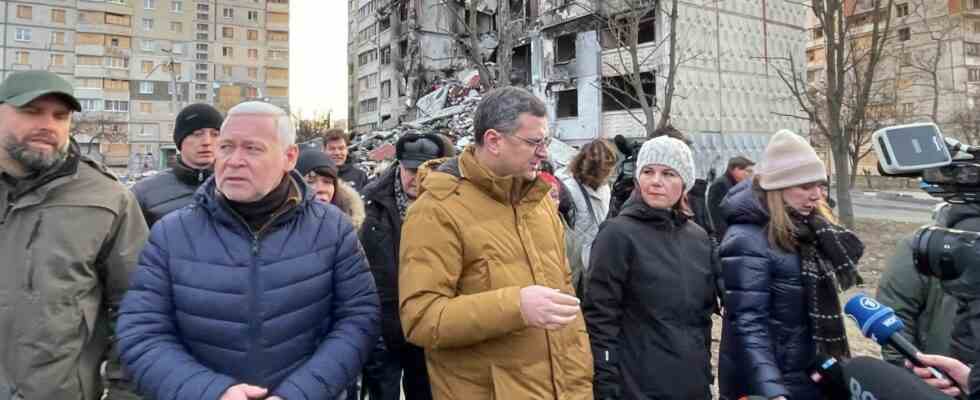Federal Foreign Minister Annalena Baerbock promised Ukraine ongoing support during a visit on Tuesday. People in all parts of Ukraine, “from Kharkiv to Kherson to Kyiv” should know that they can count on Germany’s solidarity and support, Baerbock said in Kharkiv. Specifically, she announced that the federal government would provide 20 million euros for the removal of mines and ammunition remains and a further 20 million euros for Internet connections via the satellite-supported Starlink system.
It was Baerbock’s third trip to the country since the Russian war of aggression began. Accompanied by her counterpart Dmytro Kuleba, she visited the country’s second largest city in the northeast. Kuleba thanked her for the first such high-ranking visit to the city since the beginning of the war; he put Kharkiv back on the diplomatic map. Baerbock said the city “represents the absolute madness of the Russian war of aggression” and the suffering of the people. At the same time, Kharkiv stands for the courage of the Ukrainians to resist Russian aggression.
For months, Russian troops had besieged, bombed and shelled Kharkiv, which is only about 40 kilometers from the border, and shelled it, killing hundreds of civilians. Russian soldiers advanced to the outskirts of the city until the Ukrainian military was able to liberate the region last fall.
Charred ruins bear witness to the heavy attacks to this day
Kuleba led Baerbock with Kharkiv mayor Ihor Terekhov and the governor of the eponymous oblast Oleh Synehodov to a substation in the suburb of Salyutyne, which Russian troops have destroyed with rocket attacks. If it is not possible to restore the power supply within a few hours after such attacks, the water and heat supply would also freeze at the prevailing temperatures of minus ten degrees a day, the governor explained. The city’s citizens are currently having to live with rolling shutdowns because the remaining substations did not have sufficient capacity.
You can see “deep traces of Russian destructiveness on practically every street corner,” said Baerbock, who got an idea of the severe damage in the Saltivka district. The residential area built in Soviet times with high-rise prefabricated buildings in the north-east of the city was closest to the front. Charred ruins bear witness to the heavy attacks to this day. In the district alone, 8,000 homes were destroyed. Nevertheless, people continue to live in the buildings that have been hit by grenades and rockets. Overall, about a third of the once 1.5 million residents of Kharkiv had to flee because of the Russian attacks.
Baerbock said she came to listen to residents who are being hit “so hard by the war that we can’t even imagine” this bitterly cold winter. She spoke at length with staff at a children’s hospital and with the children being treated there and their parents, visited a warm-up class and exchanged ideas with schoolchildren who had learned German with the support of the federal government.
Baerbock traveled from Kyiv to Kharkiv in the regular Intercity
Just a few days before Baerbock’s trip, the German government had announced that it would be supplying western-style tanks to the Ukraine in conjunction with the USA and France for the first time. Kyiv is to receive 40 infantry fighting vehicles of the type from Germany in the course of the first quarter marten receive. Kuleba said he hopes for the possible delivery of main battle tanks of the type challengers through Great Britain a nudge for other countries. The federal government knows deep down that this decision has to come. Baerbock said only that the federal government is continuously evaluating military aid for Ukraine with western partners.
Baerbock also emphasized the winter aid provided by Germany and other Western partners after Russia began systematically destroying Ukraine’s civilian infrastructure with missiles and drones in October. Generators, transformers and fuel should help to repair the power supply.
Baerbock had traveled from Poland by train to Kyiv on Tuesday night, where Kuleba greeted her. She continued her journey to the northeast of the country with a regular Intercity train. The visit to Kharkiv was not announced in advance for security reasons. On Monday alone, an air alarm was triggered seven times, and there were also alarms during their stay.

